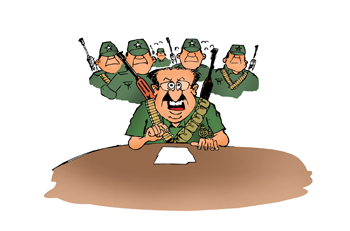
DIWAKAR CHETTRI
Once again, the Maoists have shown their wild side by attacking NC leader Gagan Thapa at a program in Rukum. Their leaders in Kathmandu keep talking of political transformation, but the cadres’ action in Rukum speaks the exact opposite.
Since they signed a peace treaty accepting mainstream politics seven years ago, the Maoists have tested the limits of democracy, using the YCL to force donations and marching armed combatants out of cantonments in a show of power. But after Baburam Bhattarai’s prolonged stint in government, which saw progress in ex-combatant integration, everyone thought their ways had changed. This latest incident in Rukum raises serious doubts over this supposed transformation.
During the insurgency, members of other parties were not allowed entry into Maoist strongholds like Rolpa and Rukum. Many local NC and UML leaders were beaten up, killed, or chased away. As the conflict grew worse, these areas became Maoist base areas. But now with elections coming up, local leaders are going back to the villages, which is why Gagan Thapa headed to Rukum recently.
A lot of NC and UML leaders became Maoists during the insurgency. So, it was only natural for some unsatisfied Maoist leaders in Rukum to join the NC. But a simple welcoming program turned violent because the Maoists in Rukum could not quit their old ways.
Not only does this raise doubts about the Maoists’ commitment to democracy, it also puts the next elections in doubt. Will they really be free, fair, and neutral as proposed?
Maybe the Maoists don’t want free and fair elections, and want to hold polls on their own terms, with violence and intimidation. If not, their actions must show they are committed to peaceful politics. The party’s leadership must take action against its wayward cadre so that other parties’ members do not have to fear for their life.
Ultimately, the Maoist leadership must accept that Nepalis don’t want a democracy defined by the Maoists, they want a democracy that ensures the rights of sovereign people.Once again, the Maoists have shown their wild side by attacking NC leader Gagan Thapa at a program in Rukum. Their leaders in Kathmandu keep talking of political transformation, but the cadres’ action in Rukum speaks the exact opposite.
Since they signed a peace treaty accepting mainstream politics seven years ago, the Maoists have tested the limits of democracy, using the YCL to force donations and marching armed combatants out of cantonments in a show of power. But after Baburam Bhattarai’s prolonged stint in government, which saw progress in ex-combatant integration, everyone thought their ways had changed. This latest incident in Rukum raises serious doubts over this supposed transformation.
During the insurgency, members of other parties were not allowed entry into Maoist strongholds like Rolpa and Rukum. Many local NC and UML leaders were beaten up, killed, or chased away. As the conflict grew worse, these areas became Maoist base areas. But now with elections coming up, local leaders are going back to the villages, which is why Gagan Thapa headed to Rukum recently.
A lot of NC and UML leaders became Maoists during the insurgency. So, it was only natural for some unsatisfied Maoist leaders in Rukum to join the NC. But a simple welcoming program turned violent because the Maoists in Rukum could not quit their old ways.
Not only does this raise doubts about the Maoists’ commitment to democracy, it also puts the next elections in doubt. Will they really be free, fair, and neutral as proposed?
Maybe the Maoists don’t want free and fair elections, and want to hold polls on their own terms, with violence and intimidation. If not, their actions must show they are committed to peaceful politics. The party’s leadership must take action against its wayward cadre so that other parties’ members do not have to fear for their life.
Ultimately, the Maoist leadership must accept that Nepalis don’t want a democracy defined by the Maoists, they want a democracy that ensures the rights of sovereign people.
To read the original article click here